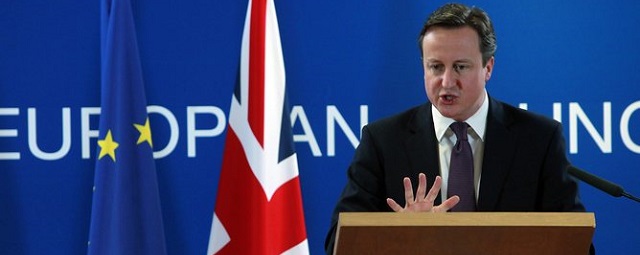Europhile bums!, said Lord Lawson, or something to that effect. Well, the exact words UK’s Finance minister between 1983 and 1989 Nigel Lawson uttered earlier this month were studiously more polite: “Too much of British business and industry feels secure in the warm embrace of the European single market, ” he said, “failing to recognise that today’s great export opportunities lie in the developing world, particularly in Asia… I strongly suspect that there would be a positive economic advantage to the UK in leaving the single market.”
David Cameron, the current Prime Minister, had kicked down the road the can of the British European Union membership with a vague promise to hold a referendum in 2015–yes, if he is re-elected. But Lawson, and much of the traditionalist wing of the Conservative Party, has given it back to him with the resolute spirit of winning this game. And this time around, it sounds reasonable.
In a way, the Great English Euroscepticism was irrational until the Eurozone began to burst here and there, and the well-meaning rhetoric of the elites in Brussels and Strasbourg fell into a provincialism-stinking pit. “The United States of Europe is not for us,” Lawson argues. In all honesty, Europeans of three quarters of the Old Continent would now agree with that statement. “We need not be members of the single market to export our products to our neighbours,” he explains, and he is correct. “The European Union has become a bureaucratic monstrosity” is another one of those phrases of Lord Lawson that would be very difficult to refute.
However, when it had to materialise as a political party, Lawson & Co.’s Euroscepticism has taken the shape of uncouth, xenophobic populism, whose programme reeks of ignorance about the ethnic diversity of modern society in its own country, ignorance about the global economy, and dishonest politicians who harangue about the futility of the European Parliament while charging expenses for meetings they do not attend (Nigel Farage), or stoke the fire against immigration while hiring Polish workers at low wages to remodel the family’s rural mansion (Roger Knapman).
English Euroscepticism was never too civilized–hatred never is. The UK Independence Party is a good example of it. But there’s nothing special here. The longing for an impossibly violent empire, apprehension of strangers, and that poisonous substance, insecurity, are a combination well known to Europeans of all origins.
UKIP has grown from 17,220 members to 26,097 in the last 12 months and gained more votes than the Liberal-Democratic Party in the recent local elections, ranking only behind Conservatives and Labour. But despair not: the English can easily combat the degradation of their national political life if they shoot with the same intellectual precision most use when discussing economics and finance.
“The GDP news that the UK economy has left the territory of recession and enters a growth phase must have inspired Chancellor George Osborne with a sense of relief,” said economist Azad Zangana in a recent note to investors by Schroders, “especially after the International Monetary Fund admonished him and recommended a partial u-turn of his plans. Yet, from our point of view, the government has been successful when not aggressively pursuing the fulfilment of fiscal deficits and focusing instead on the reform of public services.”
According to the National Institute for Economic and Social Research, NIESR, the UK GDP will rise to 1.5% between 2013 and 2014, and will stabilise over the 2% fringe between 2015 and 2017. That’s when unemployment, now at nearly 8%, will fall slightly. Not bad, relatively, compared to most European colleagues.
Perhaps at the root of these humble numbers there is the successful attempt to escape the suffocating dichotomy in which the Eurozone remains trapped. Stephen D. King, HSBC economist, puts it thus: “Since the crisis erupted five years ago, most of the ministers and their minions theorists have been sitting in the waiting room to watch time go by until it resembles what they knew. Whatever the ideological difference between Keynesians and austerity champions, both groups share the false faith to believe that with time and their respective economic policies, the good times will return. They do not realise that this will never happen.”
Gavin Oldham, director at the Share Centre for investors, brings further evidence that in the UK they are getting rid of those today obsolete concepts. Oldham argues that the mechanism by which we calculate our GDP is practically useless. “GDP fails us as an indicator of economic activity,” he explains, “because only records movements with monetary impact. But right now, our economies are demonetising themselves […] To implement measures against depression is wrong because there is no depression. Many businesses and companies would resist better if government didn’t hurt consumers spending power. It is the public finance system that is broken.”
The European Union would miss an invaluable partner if the Farages and the Knapmans impose their discourse on the Lawsons, the Milibands, the Camerons. The United Kingdom, of course, will lose much more.






Be the first to comment on "The shape of English Euroscepticism"